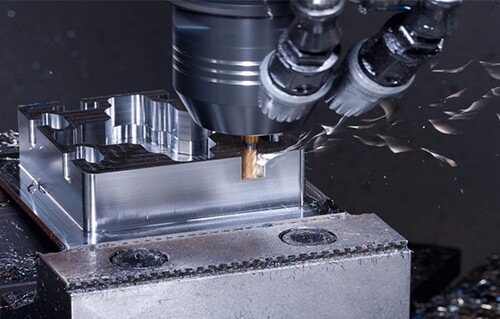Milling
Milling
At DCS Tech Industries, milling is a fundamental part of our precision machining capabilities, enabling us to produce complex parts with exceptional accuracy. Milling is a versatile machining process that involves the use of rotating cutting tools to remove material from a workpiece, shaping it into the desired form. This process is essential for creating a wide range of components, from simple to highly complex geometries.
How Milling Works
Milling operates by using a rotating cutter, which is equipped with multiple cutting edges. The cutter is fed into the workpiece in a controlled manner, removing material in thin layers. This can be done along various axes, allowing for the creation of intricate features and precise dimensions. The workpiece is typically secured on a milling machine bed, which moves in different directions to facilitate the cutting process.
There are two primary types of milling operations: vertical milling and horizontal milling. In vertical milling, the cutter’s axis is oriented vertically, allowing for precise cuts along the surface of the workpiece. Horizontal milling involves a horizontally oriented cutter, which is effective for cutting deeper or wider slots and grooves.
Versatility and Applications
Milling is renowned for its versatility, making it suitable for a broad range of applications across various industries. It can be used to create features such as slots, holes, pockets, and intricate patterns. Milling is ideal for producing parts with complex shapes, including those with multiple surfaces or detailed contours.
In the aerospace industry, milling is used to manufacture components with precise geometric features and tight tolerances. The automotive sector relies on milling for producing parts that require high strength and durability, such as engine components and transmission housings. In the medical field, milling is employed to create custom prosthetics and implants with exact specifications.

Types of Milling Machines
At DCS Tech Industries, we utilize several types of milling machines to accommodate different machining needs:
Vertical Milling Machines: These machines feature a vertically oriented spindle and are well-suited for drilling, boring, and milling operations on flat surfaces. They are ideal for precision work and detailed features.
Horizontal Milling Machines: Equipped with a horizontally oriented spindle, these machines are used for heavier cutting operations and can handle larger workpieces. They are effective for creating wide, flat surfaces and deep cuts.
Universal Milling Machines: These machines offer flexibility with adjustable spindles and table movements, allowing for both vertical and horizontal milling. They are versatile and can handle a wide range of milling tasks.
CNC Milling Machines: Our CNC (Computer Numerical Control) milling machines provide automated precision and efficiency. They are programmed to perform complex milling operations with high accuracy and repeatability, making them ideal for both prototype and production runs.
Benefits of Milling
Milling offers several advantages that make it a preferred machining process:
Precision: Milling provides high precision and the ability to achieve tight tolerances, ensuring that parts meet exact specifications.
Flexibility: The versatility of milling allows for the creation of a wide range of part geometries and features.
Efficiency: Milling machines can operate continuously, making them suitable for both small-batch and large-scale production.
Surface Finish: Milling can produce smooth surface finishes, reducing the need for additional finishing processes.
Quality and Expertise
At DCS Tech Industries, we are committed to delivering high-quality milled components that meet the highest standards. Our experienced team uses advanced milling machines and cutting tools to ensure precision and consistency in every part we produce. From initial design to final inspection, we maintain rigorous quality control measures to guarantee that each component meets our clients’ exact requirements.

